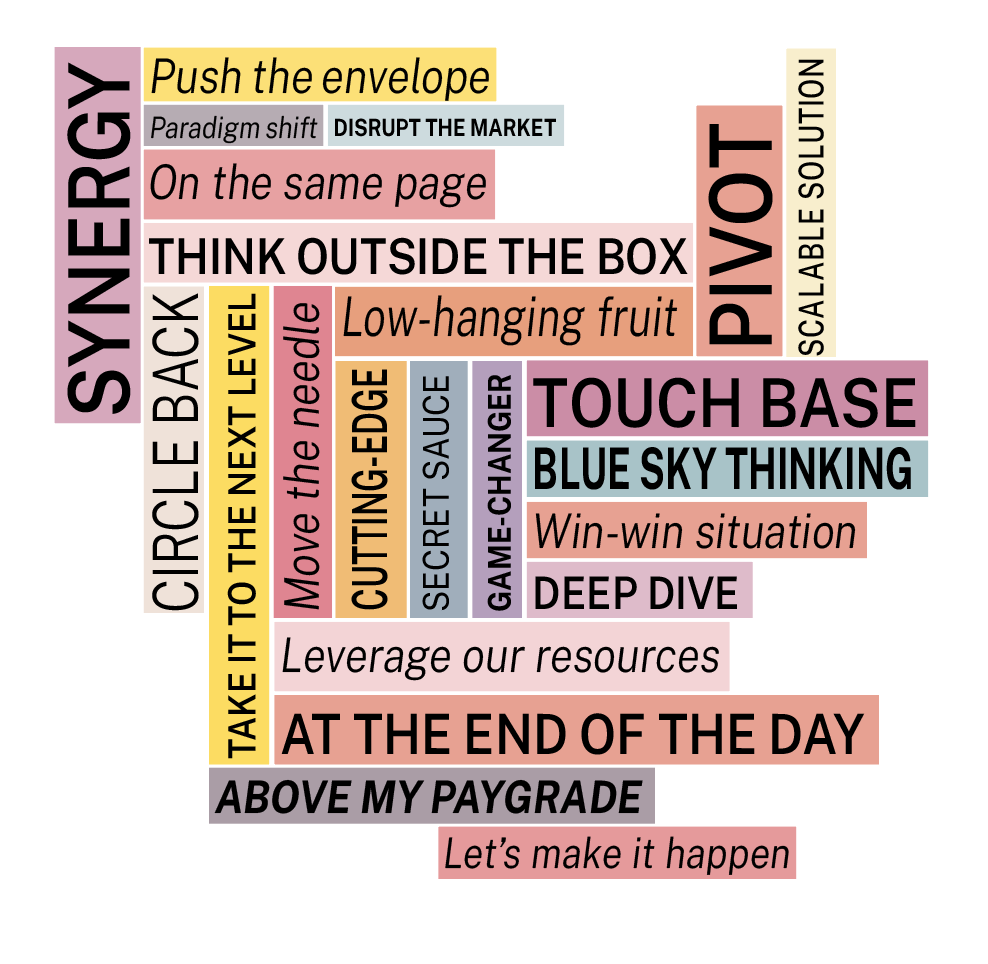
How to succeed as an enterprise co-pilot: Three priorities for the modern CFO
Schindler CFO Carla De Geyseleer explains how today’s CFO acts as a strategic co-pilot, uses sustainability to drive growth, and develops future finance leaders....

by Peter J. Meyers Published May 5, 2025 in Leadership • 8 min read • 
How much of the language in our day-to-day business interactions is wrapped in jargon: the over-used buzzwords that provide a linguistic shortcut to what we want to say? From boots on the ground or low-hanging fruit to blue-sky thinking and defending our position, we all do it. We all use this surface lexicon that spares us the effort of bringing original thinking to our interactions.
In our relentless pursuit of efficiencies – a corner-cutting that extends to the way we speak –we’re creating a world where interaction becomes superficial, meaning muddied, and inspiration and engagement are swapped out for utilitarianism. Just look at the stats. Workforce engagement has sunk to less than 23% globally, according to Gallup, with less than half of employees understanding what is expected from them at work. The same survey reveals that less than 30% of workers feel any real sense of mission or purpose in their jobs. The language of leadership is a contributing factor that needs to be addressed.
In my work with leaders from Fortune 500 companies over the past 25 years in 32 countries, I’ve asked what percentage of the time people find themselves disconnected from a conversation or meeting. The answer? Between 50% and 80% of the time. Consider the loss of investment from our most precious resource – time and talent – if we’re unable to listen to each other at least half of the time. The problem is getting worse: holding someone’s focus for any length of time feels like a heroic act.
Communication at work is about more than sharing goals and targets. It is about connecting with people and elevating their work so they aspire to achieve more and make a difference in the world. When we resort to management speak, we not only risk robbing that work of its soul, but it becomes more difficult for people to stay engaged and focused. We don’t realize that we’re reaching for the same worn-out phrases, and over time, we fail to notice that fewer people are listening.
In falling back on those pat phrases, we eschew the granularity of communication, direction, and feedback that people need to learn, grow, and think more creatively, let alone feel inspired and motivated. How many times have you heard a team member praised with phrases like “good job”, “you killed it”, or “you knocked them dead in there”, but failed to go into what specifically was so effective? How often do you take the time to explain to someone what they are doing well (or poorly) and what it means to the work and their career progression, to the organization, or to the impact you seek to have through the work?
Do you ever question the language you use? Do you think about the message that people are receiving? Does it align with your intentions? How do you or the tone you adopt come across to others?
We need language to think, process, create, solve problems, and devise new ideas. If we erode language and settle for linguistic shortcuts, aren’t we in danger of eroding our thinking and the quality of our leadership? We have hundreds of conversations every week, each an opportunity to touch, move, or inspire each other. But how often do we fail even to make a connection?

Language matters. Communication is as much a core leadership skill as any other. In a world where purpose and meaning are missing, engagement is plummeting, and employees are switching off, leaders need to dig deeper to find the words not just to inform (or “tick a box”) but to inspire. Here are a few things you can try:
Reading expands your vocabulary: the work of great authors, for example, will expose you to more nuanced ways of expressing yourself. Then there’s the magic of reading a classic aloud.
When you read something aloud, you engage more fully with the language. You simultaneously use your eyes, ears, and intellect. There is a kinaesthetic response within your mouth and tongue as you form the words. This creates neural pathways that run parallel to the author’s thinking. It’s like following in the tracks of a great sprinter or cooking a meal with a master chef.
Try picking an author whose work you love – for me, that would be a David Foster Wallace or a Ralph Waldo Emerson – and walk around your study or a room, reading their work out loud as if it were your own thoughts. After half an hour or so, try writing something. It doesn’t have to be anything specific: automatic writing is ideal. When you’re done, review your writing and see if new words and syntactical structures are available to you.
When you speak to a colleague or a client, how often do you pause and ask yourself: What does this person need from me? What are their psychological and emotional needs, as well as their business needs?
When speaking to others, we often fixate on our own needs. We use the first-person pronoun: I want, I expect, I need. In doing so, we miss an opportunity to inspire or lift another person.
In my book, As We Speak, I make this point emphatically. Individuals are interested in themselves. We all want to hear things that matter to us and us alone. As a leader, if you use “I” excessively, you risk having your interlocutor switch off and disengage cognitively, emotionally, and psychologically. Switch the “I” and “you” ratio. Lead with “you”: Here’s what you need, what you expect and want, and what your challenges look like. Make the exchange about the other person. Using the pronoun “you” shows other people that you consider and care about their concerns and needs.
When we communicate, we bring an energy that determines how well we engage with or inspire our audience. Think about actors, musicians, athletes, or dancers and the exercises they do – the psychological and emotional warm-up that ultimately decides how they perform.
If you know you are going to speak to someone, prepare in advance. Find a way to access a state of mind that is resourceful and optimistic, where instead of frustration or boredom, anger or fear, you are primed to show up with a sense of purpose, with intellectual generosity, with a gift that you have prepared that you want to share with others.
Make it a habit to warm up before communicating with others and find ways to drop into a zone where you feel resourceful: primed to choose words, open doors, and express emotions that encourage, empower, and inspire.
We use about 10,000 words a day. Of those, hundreds come blasting out of our mouths like linguistic bombs: let’s set the world on fire; we destroyed the competition; take your best shot; let’s bite the bullet; bring out the big guns. The language of violence pervades the way we communicate: micro-aggressions that infiltrate our common vocabulary, subtly conditioning the way we connect.
Although, as a society, we’ve made progress in banishing abusive terminology – slurs that tie to gender, race, or sexual orientation – we still need to pause and re-examine the way we communicate.
In the age of AI and robotics, for example, do we want to refer to our skills, knowledge, or body and voice as “tools?” As we aspire to gender equality, do we want to refer to women as “working moms?” And when leadership sits at that inflection point between motivation and demoralization, do we want to stick to the vernacular of war?
I’m not suggesting you must formulate a new lexicon, but I would challenge you to think more about the language you use in your leadership practice. Be conscious of the words that you choose.
We are entering a new era in leadership, an era in which automation, AI, and technology will take over mundane tasks, and the onus will be on leaders to bring out the best in people.
Getting this right will require us to find a new language that speaks to the deeper and richer possibilities of humans. That will require a serious improvement in our thinking, interpersonal strategy, and vocabulary.

“We were in their crosshairs. We circled the wagons, rallied the troops, and called for a sit-down. ”
One of the curiosities of management speak is the pervasiveness of war terminology and the language of violence. I’ve assembled some examples in the mock monologue – some of the most common phrases we hear and use daily like knotweed, strangling authenticity and meaning. It’s something we all do. Being aware of it is the first step toward communicating more effectively.
Ask yourself, what do these phrases mean? How often do you use or hear them? Is this what you really want to say? How many are synonymous with war or violence? What impact do you think that has on us? How could you say the same things in a more human and relatable way?
“We’ve been on the front lines for this client for a long time. They were hitting their targets but wanted more bang for their buck. They were eating up the competition. It was like shooting fish in a barrel. But last year, we started to lose ground, and it’s been an uphill battle for the last six months. The client has always been a real straight shooter. We were in their crosshairs. We circled the wagons, rallied the troops, and called for a sit-down. We had a new idea and decided to pull the trigger with a killer presentation.
We had established a beachhead in the company and came armed with intel about dissension among the ranks. We had a plan of attack to halt what looked like a coup. We fired the opening volley, and before we knew it, they were shooting holes in every bullet point, blowing our argument to pieces. Then, they dropped a bomb, saying our strategy had created a ton of collateral damage to their brand. We had our backs up against the wall. We were facing the firing squad. They hammered us with a barrage of questions. All we could do was shoot from the hip and try to keep them at bay.
I thought it was overkill. We had hit our targets just as they asked. It’s not our fault there’s a trade war going on. So, we’re not pulling our punches anymore: we’re armed with the facts – locked and loaded. We’re going in with more boots on the ground. We’re going to kill it this quarter.”

CEO of Stand & Deliver
Peter J. Meyers founded the consultancy and training firm Stand & Deliver in 2000. He developed the company’s “high-performance leadership communication” methodology by building upon experiences and insights from art and sports psychology. His book As We Speak: How to Make Your Point and Have It Stick, co-written with Shann Nix, is published by Simon & Schuster.

13 hours ago in Leadership
Schindler CFO Carla De Geyseleer explains how today’s CFO acts as a strategic co-pilot, uses sustainability to drive growth, and develops future finance leaders....

February 20, 2026 • by Jennifer Borrer, Lisa Casper, Saule Serikova in Leadership
The fast-growing sector needs a unique leadership archetype to realize its full potential. After interviewing key players in the industry, senior executives at WittKieffer offer a blueprint for success....
 Audio available
Audio available
February 20, 2026 • by Nathalie Ducrot in Leadership
Elizabeth faces a career crossroads and works with a coach to clarify her ambitions, negotiate her future, and harness the power of constructive disagreement...

February 13, 2026 • by David Sluss, Katie Badura, Yufei Zhong in Leadership
Passion for the product is vital to launch a startup, but it’s not enough to lead a scaling enterprise. David Sluss, Katie Badura, and Yufei Zhong share a two-step approach to...
 Audio available
Audio availableExplore first person business intelligence from top minds curated for a global executive audience